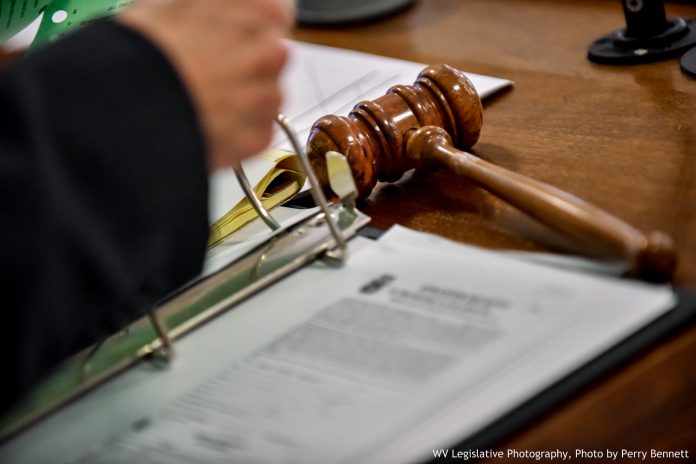As of 4 p.m., Wednesday, February 18th, 2009, the eighth day of the 79th Legislature’s 1st Regular Session, 654 bills have been introduced in the House of Delegates. Of those, 2 have passed and have been sent to the Senate for its consideration. Those bills passed were:
House Bill 2305 would revise appointment and compensation provisions of the Supreme Court Clerk and his or her staff. The bill would allow justices to appoint a clerk and any other full-time and part-time professional and clerical assistants. The justices would establish the salary of the clerk and the persons employed within the clerk’s office. The Justices of the Supreme Court of Appeals would establish the salary of the clerk and persons employed within the clerk’s office.
House Bill 2306 would add motor vehicles to the definition of impersonating a public official or employee. Vehicles that falsely display an official emblem or other marking indicating government sponsorship would fall under impersonation.
A Sampling of Bills Introduced In the House
House Bill 2043 would require anyone insured whose automotive liability insurance contract or policy has been canceled or not renewed provide proof of valid insurance for a vehicle covered under that policy within 30 days notice from the Division of Motor Vehicles. Failure to provide proof of insurance within the 30 days would render any vehicle under the canceled or non-renewed insurance policy invalid. Any person driving a vehicle with an invalid registration plate would be found guilty of a misdemeanor and fined.
House Bill 2066 would prohibit fractional pricing in the retail sale of gasoline. The bill would also define such pricing as an unfair or deceptive practice.
House Bill 2090 would provide a housing supplement for members of the State Police who reside in a county in which the average monthly mortgage payment exceeds $700. The payments would be made in equal monthly installments and would be considered part of the state minimum salaries for members of the State Police.
House Bill 2100 would establish a system of extended involuntary treatment for individuals addicted to drugs and alcohol. Only parents, close family or a friend could file the petition for the involuntary commitment and would be responsible for the payment of treatment costs. Those individuals filing for petition would request involuntary commitment for 60 or 365 days. An individual could not be held involuntarily unless they; suffer from alcohol and other drug abuse, present an imminent threat of danger to themselves or others or could reasonably benefit from treatment.
House Bill 2109 would increase the exemption on retirement income from taxation on individuals 65 years and older, or their surviving spouse from $8,000 a year to $15,000 a year.
House Bill 2139 would establish a volunteer litter reporting program that would utilize trained volunteers to report and collect information necessary in enabling the county sheriffs to issue citations to individuals violating the state’s litter laws. Duties of a trained volunteer would include: reporting the motor vehicle registration plate number, date, time and location of a person observed littering; collecting other evidence such as taking photographs at the request of the county sheriff, providing testimony in court proceedings relating to litter violations observed, and providing other assistance in litter enforcement as requested by the county sheriff. In no event could a volunteer participate in the direct apprehension or arrest of a litter violator.
House Bill 2335 would require West Virginia public colleges and universities to participate in the federal Yellow Ribbon G.I. Education Enhancement Program established under the new G.I Bill. The program would provide eligible veterans additional funding toward the cost of college tuition and fees. Educational benefits to certain veterans would equal the cost of in-state tuition at the most expensive public university or college in the state. The federal Secretary of Veterans Affairs would cover fifty percent of any additional costs over and above in-state tuition costs in exchange for a matching contribution from the college or university the veteran would attend.
House Bill 2338 would eliminate the six-month waiting period for those in the Teachers Retirement System to receive disability retirement benefits.
House Bill 2341 would require the State Board of Education to create a school drug safety program. The program would include drug testing of individuals prior to being hired, transferred or promoted within a school. This bill would also include random drug testing for anyone employed at a school.
House Bill 2354 would create the Traumatic Brain Injury Services Commission. The Commission would assist military veterans and other West Virginians with traumatic brain injuries. The Commission would provide services to help the injured regain as much quality of life and productivity as possible.
House Bill 2361 would require lobbyists and lawyers when performing lobbying services to collect consumer sales and service tax.
House Bill 2386 would define gross income for purposes of determining child support and would provide that certain employment-related expenses are excluded from gross income.
House Bill 2402 would require the instructional school term to begin on August 21. It would also provide for county school boards to meet the mandatory 180- day instructional days in the annual school calendar. If needed, an additional non-instructional day prior to the beginning of the instructional term may be scheduled.
House Bill 2404 would authorize the West Virginia Regional Jail and Correctional Facility Authority to assess charges against inmates for medical services. The bill permits a reasonable co-payment to be deducted directly from an inmate’s trustee account for non-emergency medical treatment.
House Bill 2513 would provide a $2,000 pay incentive to teachers who teach in their core field degree.
House Bill 2568 would require background checks on applicants for residents in nursing homes and assisted living facilities. The bill would provide applicants who are sex offenders or certain convicted felons with other arrangements.
House Bill 2583 would require health care providers to release unemancipated minor’s medical records for drug testing to a parent or legal guardian without written consent from the minor.

